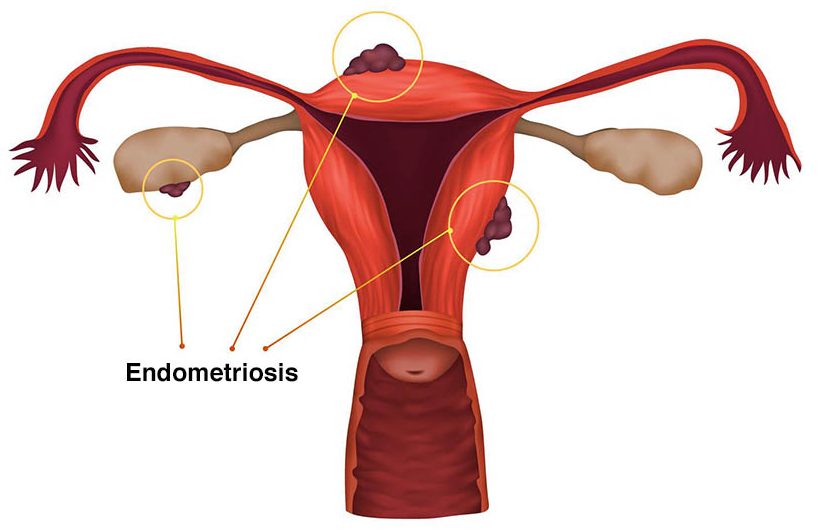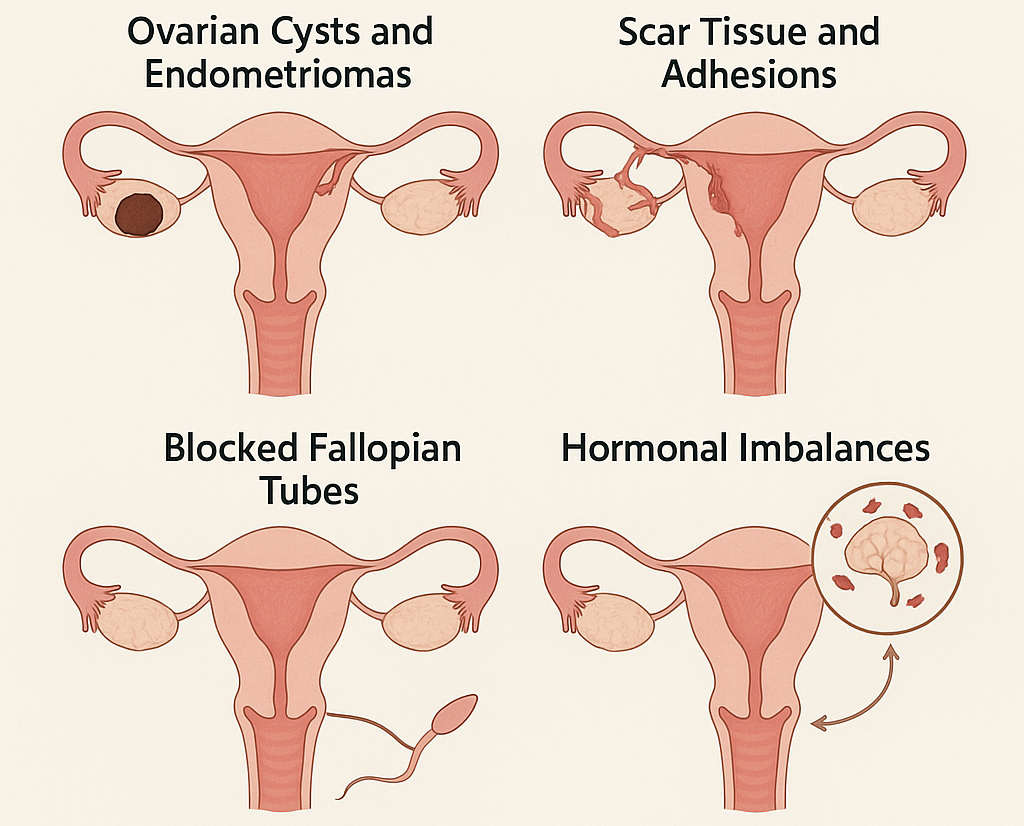How Endometriosis Affects Your Fertility: Diagnosis & Care
Endometriosis is a prevalent yet often misunderstood condition that affects a large number of women worldwide. It occurs when tissue similar to the uterine lining grows outside the uterus, leading to a range of symptoms, including pelvic pain and infertility. While endometriosis is a chronic condition, many women with endometriosis can still conceive, especially with the right treatment.
This article will explore how endometriosis impacts fertility, the diagnostic methods and available treatment options, including IVF, IUI and other advanced fertility care options at Lakshmi Fertility Centre in Karaikudi.

What is Endometriosis?
Endometriosis is a condition where tissue similar to the lining of the uterus (endometrium) grows outside the uterus, typically on the ovaries, fallopian tubes and the outer surface of the uterus. This abnormal tissue behaves in the same way as the uterine lining: it thickens, breaks down and bleeds with each menstrual cycle. However, unlike the tissue inside the uterus, this tissue has no way of leaving the body, leading to inflammation, scarring and adhesions. You can learn more about endometriosis from the National Institutes of Health (NIH).
Key Statistics
- Prevalence: Around 10% of women of reproductive age worldwide suffer from endometriosis.
How Endometriosis Affects Fertility

Endometriosis can severely affect fertility, making conception more difficult. Here are some key ways in which endometriosis impacts a woman’s ability to conceive:
- Ovarian Cysts and Endometriomas: One of the most common effects of endometriosis is the formation of cysts on the ovaries, known as endometriomas. These cysts can reduce ovarian reserve (the number and quality of eggs) and interfere with normal egg release during ovulation, making it harder to conceive naturally.
- Scar Tissue and Adhesions: Scar tissue or adhesions can form when the endometrial tissue grows on pelvic organs. This tissue can bind the ovaries, fallopian tubes and the uterus together, preventing the eggs from being released or the sperm from reaching the egg. This blockage can make natural conception more difficult.
- Blocked Fallopian Tubes: The fallopian tubes are essential for fertilization as they transport the egg to the uterus. Endometriosis can cause scarring and blockages in these tubes, making it difficult for sperm to reach the egg or for the fertilized egg to travel to the uterus.
- Hormonal Imbalances: Endometriosis may disrupt the hormonal balance necessary for successful pregnancy. Hormones regulate ovulation and pregnancy maintenance and any imbalances can impact a woman’s fertility.
Diagnosing Endometriosis and Its Impact on Fertility
Diagnosing endometriosis can be challenging because its symptoms often overlap with other conditions. The process typically involves a combination of medical history, physical exams and imaging tests.
- Pelvic Exam: A pelvic exam allows the doctor to check for cysts or scars on the pelvic organs, although it may not reveal all cases of endometriosis.
- Ultrasound: While an ultrasound can detect larger cysts (endometriomas), it is not always effective in identifying smaller endometrial lesions or scarring. However, it helps in monitoring ovarian health and identifying visible abnormalities.
- Laparoscopy: Laparoscopy is considered the gold standard for diagnosing endometriosis. This minimally invasive procedure involves inserting a small camera into the abdomen through a small incision. It allows the doctor to view the endometrial tissue outside the uterus, confirm the diagnosis and assess the extent of the disease.
To learn about the prevalence and global impact of endometriosis, refer to World Health Organization (WHO).
Fertility Treatment Options for Endometriosis
If endometriosis is affecting fertility, several treatment options can help manage the condition and increase the chances of pregnancy. The best treatment plan depends on the severity of the disease, the woman’s age and how long she has been trying to conceive.
1. Medical Treatments for Endometriosis
- Hormonal Therapy: Hormonal treatments such as birth control pills, progestin-only therapy and GnRH agonists help reduce or eliminate menstruation. This prevents the growth of endometrial tissue and eases pain, improving the chances of conception.
- Pain Medications: Non-steroidal anti-inflammatory drugs (NSAIDs), like ibuprofen, can help manage pain associated with endometriosis, although they do not directly improve fertility.
2. Surgical Treatments for Endometriosis
For women with moderate to severe endometriosis, surgery may be necessary to remove the endometrial tissue, cysts and adhesions.
- Laparoscopic Surgery: This minimally invasive surgery removes endometriosis tissue while preserving the uterus, ovaries and fallopian tubes. It can improve fertility by restoring the normal anatomy of the reproductive organs.
- Ovarian Cyst Removal: If endometriomas are present, removal of the cysts can help restore normal ovarian function and increase the chances of natural conception or success with fertility treatments.
3. Assisted Reproductive Technologies (ART)
For women whose fertility issues are not resolved with surgery or medications, assisted reproductive technologies may be necessary. These include treatments like IVF, IUI and ICSI.
- In Vitro Fertilization (IVF): IVF is the most common and effective treatment for endometriosis-related infertility. IVF involves stimulating the ovaries to produce multiple eggs, which are then retrieved, fertilized in a laboratory and the embryos are transferred back to the uterus. Success rates for IVF are generally higher for women with endometriosis compared to other fertility treatments.
- Intrauterine Insemination (IUI): IUI is a less invasive procedure where sperm is placed directly into the uterus during ovulation. This method is often used for women with mild endometriosis or those who have been trying to conceive for a shorter time.
- Intracytoplasmic Sperm Injection (ICSI): ICSI is a form of IVF in which a single sperm is injected directly into an egg. This technique is often used when male fertility issues are present in addition to endometriosis.
Success Rates of Fertility Treatments for Endometriosis
The success of fertility treatments for endometriosis depends on several factors, such as the severity of the disease, the woman’s age and other health considerations.
- IVF Success Rates: Success rates for IVF in women with endometriosis are lower than for women without the condition, but IVF is still an effective treatment. For women under 35, IVF success rates can range from 40-50%. Women with severe endometriosis may experience lower success rates.
- IUI Success Rates: The success rate of IUI in women with endometriosis is typically lower, around 10-20% per cycle, especially in cases with moderate to severe endometriosis.
- ICSI Success Rates: Since ICSI is used as part of IVF, its success rates are similar to those of IVF. ICSI can be especially helpful if male infertility is also present in addition to endometriosis.
FAQs
1. Does endometriosis always cause infertility?
No, not all women with endometriosis experience infertility. Many conceive naturally or with treatment.
2. How can endometriosis affect my chances of getting pregnant?
Endometriosis can cause blockages, reducing the chances of conception by affecting the fallopian tubes and ovaries.
3. Can endometriosis be treated without surgery?
Yes, hormonal therapy can manage symptoms, though surgery may be needed for severe cases.
4. What is the best treatment for infertility caused by endometriosis?
IVF is often recommended for moderate to severe cases. IUI may work for mild cases.
5. How does laparoscopic surgery help women with endometriosis?
It removes or reduces endometrial tissue and scarring, improving fertility by clearing blockages.
6. Can endometriosis affect my pregnancy?
Endometriosis increases the risk of miscarriage and complications, but many women with the condition have healthy pregnancies.
Conclusion
Endometriosis is a complex condition that can impact fertility, but with the right treatment, many women can still achieve their dream of becoming parents. At Lakshmi Fertility Centre in Karaikudi, we specialize in treating endometriosis-related infertility with a holistic approach that combines medical expertise and compassionate care. Our experienced doctors provide personalized treatment plans, supported by state-of-the-art facilities and advanced fertility techniques.
Whether you’re facing infertility due to endometriosis or other conditions, we’re here to guide you through your fertility journey with utmost support and professionalism. Contact us for expert diagnosis and treatment options.
